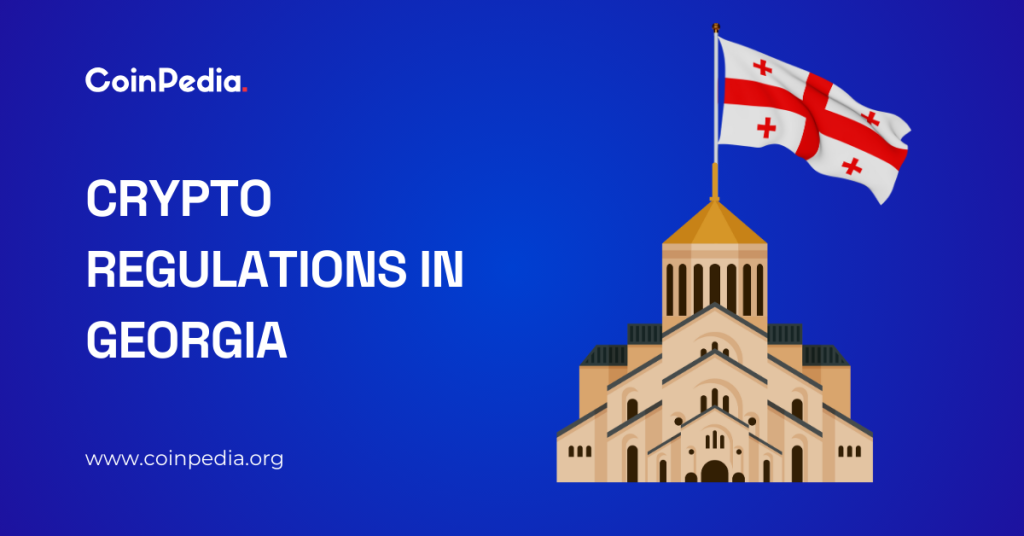ARTICLE AD BOX

The post Crypto Regulations in Georgia 2025 appeared first on Coinpedia Fintech News
Georgia is one of the top 10 bitcoin-friendly countries with a favorable tax regime. It has the second-highest bitcoin mining hashrate, making it a leader in the global crypto sphere. With low-cost electricity, the country is attracting new crypto startups and investors for crypto-related activities.
Cryptocurrency is not considered legal tender in Georgia; however, owning and trading crypto for exchange and investment purposes is permitted. The country has regulated several laws to develop the crypto ecosystem.
Table of contents
Crypto Regulations in Georgia
- The most important crypto regulation in Georgia to date is the ‘Virtual Asset Service Provider (VASP) registration law.’ The National Bank of Georgia (NBG) regulated this law in 2023 to maintain the secure transfer and safekeeping of virtual digital assets.
- In 2025, Georgia is emphasising the integration of digital assets into anti-money laundering (AML) and countering the financing of terrorism (CFT) regulations. By 2026, Georgia will fully implement this new framework of VASP law.
Timeline of major crypto regulations in Georgia
| DATE | Regulation/ Law |
| March 18, 2024 | IMF emphasised strong AML/ CFT regulations |
| January 1, 2023 | Licensing for crypto companies |
| July 1, 2023 | The VASP registration law enacted |
| June 13, 2023 | NBG issues order no. 94/04 (VASP requirements) |
| August 1, 2023 | AML/ CFT rules updated for virtual assets with KYC |
What the Georgian Government is Saying About Crypto?
- AML/CFT: The National Bank of Georgia (NBG) is responsible for regulating crypto-related laws. Its robust regulatory framework focuses on AML / CFT regulations to maintain integrity in financial systems.
- Transparency and safekeeping: NBG requires all financial digital platforms to report suspicious activity and identify users to prevent fraudsters from luring customers. It collects data on cryptocurrency transactions to improve transparency and create a trusting digital wallet platform.
- Crypto asset in the economy: The NBG-enacted laws are enforced through the Financial Monitoring Service (FMS), aiming to develop blockchain infrastructure. Currently, NBG is considering applications for potential digital assets to integrate them into the economy.
Crypto License in Georgia
The crypto licenses in Georgia vary, depending on the type of services the companies want to offer. The National Bank of Georgia is the primary body regulating licensing for virtual asset service providers (VASPs), such as:
- Exchange License: Exchanges like UEEx, Cryptal, Binance, and GeCrypto are required to obtain from the National Bank of Georgia. This licensing allows the companies to exchange cryptocurrencies for fiat currencies and vice versa; KYC/AML compliance is mandatory.
- Asset Storage License: It is needed for conducting initial coin or token offerings to raise funds for projects.
- ICO/STO License: Companies are required to detailed project description to conduct initial coin or token offerings to raise funds for projects.
Crypto Tax in Georgia
- No capital tax: The Georgian government has not imposed any capital tax on crypto-related activities for individuals.
- Income tax: Profits from crypto trading and sales are exempt from the income tax policy of Georgia, since the income from crypto is considered foreign-sourced. It applies only to Georgian tax residents.
- VAT: Does not apply to any crypto exchange.
- Condition applied: To benefit from these tax-free regimes, one must qualify as a Georgian tax resident, which can be acquired after spending at least 183 days in Georgia within a 12-month period. This qualification can be earned via the high net worth (HNW) individual program as well.
- Companies/ Businesses: Georgian companies engaged with cryptocurrency are subject to 15% corporate income tax (only taxable after the distribution of profit, with an additional 5%). Crypto mining is subject to the same tax regime.
- Special condition: Georgia offers small business status (SBS) with a 1% turnover tax. If the turnover for 500,000 GEL is exceeded, it disqualifies the business of SBS.
Crypto tax Table
| Categories | Individuals | Companies (mainland) | Companies (free zone) |
| Income tax on crypto | 0% | 15% (on distribution) | 0% |
| Capital tax | 0% | 15% (on distribution) | 0% |
| VAT on crypto | 0% | 0% | 0% |
| Divided tax | NA | 5% | 5% |
Crypto Adoption Rate in Georgia
- User Penetration Rate: In 2025, the user penetration rate in Georgia for cryptocurrency is projected to be 14.13%, representing 153,350 Georgian users in the cryptocurrency market.
- Digital asset market: Revenue of US$1.9 million in 2025; average revenue per user is estimated to be US$12.1.
- Growth: Georgia is experiencing a growing interest in digital assets and cryptocurrency in the country. And with tax-free regimes for individuals, it is likely to evolve in the upcoming days.
Georgian Government Crypto Holdings
- Bitcoin holding: As of 2025, the Georgian government holds over 66 Bitcoins, worth $6.86 million. It ranks eighth globally in bitcoin holdings. The crypto market in Georgia is emerging rapidly, which might take it higher on the global chart in crypto holdings.
- Other cryptocurrency holdings: No public disclosure has been made by the Georgian government; policies focus on developing the crypto framework with enhanced regulations.
Conclusion
Georgia’s proactive approach to cryptocurrency has marked its position as a crypto hub in 2025. The government’s focus on making crypto-friendly regulations without imposing tax is to attract foreign investments. It also supports the private sector engaging with crypto if they comply with the regulations set by the federal law.
Never Miss a Beat in the Crypto World!
Stay ahead with breaking news, expert analysis, and real-time updates on the latest trends in Bitcoin, altcoins, DeFi, NFTs, and more.
.png)
 10 hours ago
1
10 hours ago
1








 English (US)
English (US)